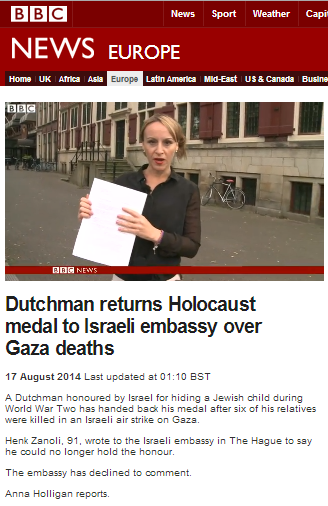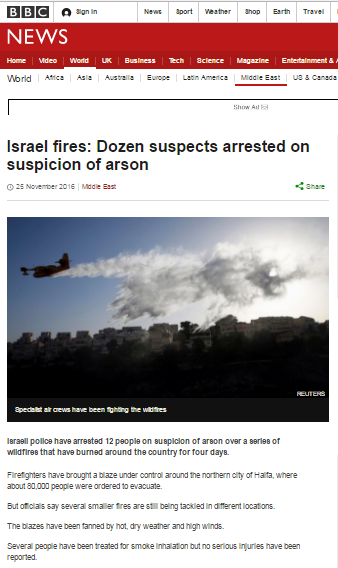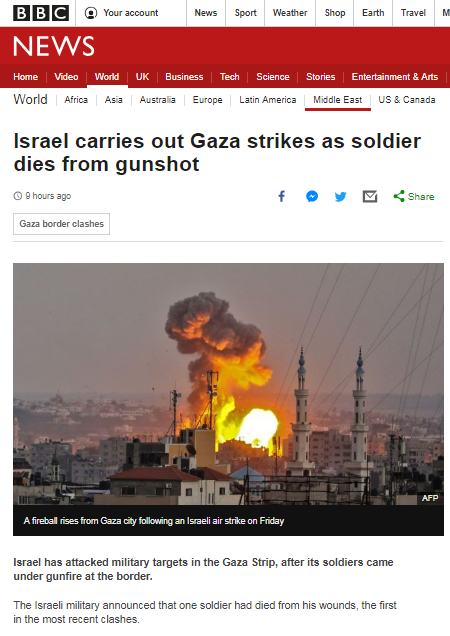Last week we looked at the way in which the story of the US president’s statement recognising Jerusalem as Israel’s capital city was framed in reports on the BBC News website even before that announcement had been made.
BBC radio stations likewise devoted coverage to that story prior to the actual announcement. BBC World Service radio, for example, aired items about that story in four different programmes in the twenty-four hours before the statement was issued.
December 5th:
1) ‘Newshour’ presented by Tim Franks (from 00:34 here).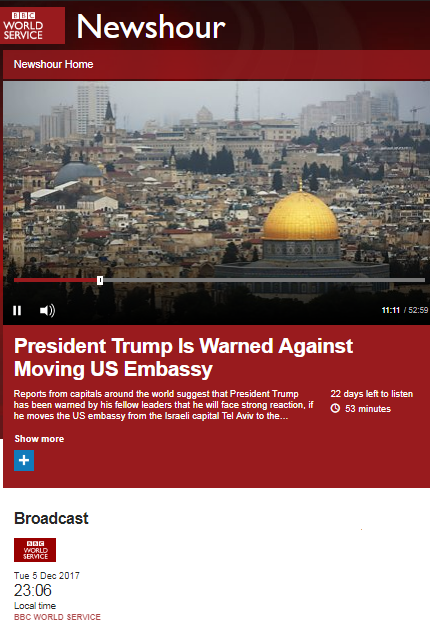
In that item listeners heard from the BBC’s Yolande Knell who did note the existence of the US’s ‘Jerusalem Embassy Act of 1995’, its recognition of Jerusalem as the capital of Israel and the waivers signed by US presidents since then. In addition listeners heard negative reactions to the anticipated announcement from the PA’s Nabil Shaath and from Jordan’s Prince Hassan bin Talal who misrepresented the 2004 ICJ advisory opinion on the “legal consequences of the construction of a wall in the occupied Palestinian Territory” as a “legal ruling” with no challenge from Franks. A negative opinion was also heard from the former advisor to US administrations Aaron David Miller. No Israeli voices were present in that programme.
December 6th:
2) ‘Newsday’ presented by Lawrence Pollard and Andrew Peach.
The early edition of that programme included a re-broadcasting of the statement from Nabil Shaath, an interview with Israeli journalist Anshel Pfeffer and an interview with Mustafa Barghouti which was discussed here.
A later edition included interviews with American human rights lawyer Brooke Goldstein and Saree Makdisi which was discussed here and a still later edition of the programme recycled a version of Barghouti’s comments and reporting from Yolande Knell.
3) ‘The Newsroom’ presented by Claire MacDonald.
In that programme (from 00:05 here) listeners heard reporting from the BBC’s Jonathan Marcus and recorded statements from the PLO’s Manuel Hassassian and Israeli minister Naftali Bennett.
4) ‘Newshour’ presented by James Coomarasamy.
In addition to reporting from the BBC’s Barbara Plett-Usher (from 00:05 here) listeners heard interviews with Mustafa Barghouti, Israeli MK Yoav Kish and a Jerusalem bookseller called Mahmoud Muna. Later on in the same programme listeners heard a problematic portrayal of Jerusalem’s history from British academic Mick Dumper which was discussed here.
In all, listeners to those four BBC World Service programmes heard two from two American interviewees (one presenting the announcement as negative and one as positive), two Israeli politicians and one Israeli journalist. They also heard negative views from one Jordanian and one British academic as well as in interviews with Palestinian commentators that were promoted (including repeats) a total of eight times.
In other words, negative views of the anticipated announcement got nearly three times as much exposure as positive ones on the BBC World Service in the twenty-four hours preceding the US president’s statement.
Listeners to BBC Radio 4 heard the topic discussed in three programmes on the same day.
December 6th:
1) ‘Today’ presented by Mishal Husain and John Humphrys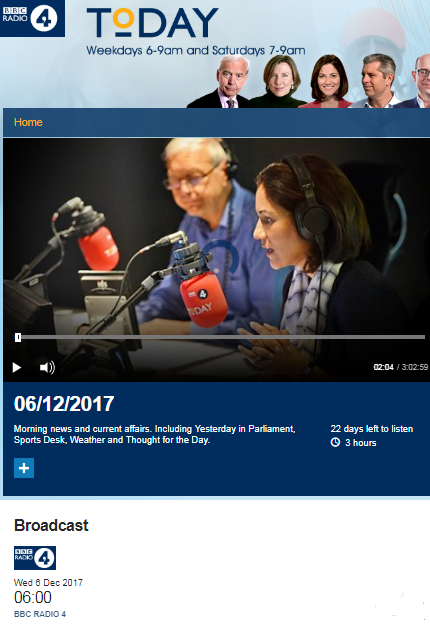
That programme included reporting from the BBC’s Yolande Knell, Barbara Plett Usher and Jon Sopel as well as interviews with the mayor of Jerusalem Nir Barkat (discussed here) and the PLO’s Manuel Hassassian (discussed here).
2) ‘World at One’ presented by Martha Kearney
In that programme listeners heard from the BBC’s Middle East editor Jeremy Bowen (from 34:24 here) who made no mention of the 1995 Jerusalem Embassy Act, preferring to ‘explain’ the anticipated announcement as follows:
“It was an election promise. As well as people who are Jews who are pro-Israel who may have voted for him – and in fact most Jews in America vote for the Democratic party – he’s also got a lot of support from evangelical Christians who are very, very strong supporters of Israel. So it could be that.”
3) ‘PM’ presented by Eddie Mair
In that programme too Radio 4 listeners heard from Jeremy Bowen (from 18:09 here) who, while once again failing to mention the context of existing US legislation, gave a negative view of the anticipated statement.
“It adds another potential incendiary bomb in what’s already a tense city in a tense and chaotic region. And I think that if you are interested in peace, that isn’t the right thing to do.”
While BBC Radio 4’s guest list was more balanced than that of the BBC World Service, with the exception of Nir Barkat, listeners heard a very monochrome presentation of the story.
Like the BBC News website’s coverage, these two BBC radio stations failed for the most part to provide audiences with the story’s essential context and refrained from providing the relevant – and accurate – historical background necessary for understanding of the story. Instead, their coverage was overwhelmingly focused on framing the issue according to a partisan political narrative.
Related Articles:
An overview of BBC News website coverage of the US embassy story

